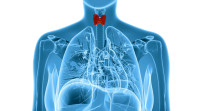
Hypothyroidism Basics
Your thyroid gland is responsible for producing the hormone triiodothyronine (commonly referred to as T3), as well as the hormone thyroxine (commonly referred to as T4). Instructions on when to make these hormones come from the chemical influence of another hormone – called thyroid-stimulating hormone or TSH – which comes from your pituitary gland. You need a certain level of T3 and T4 circulating in your bloodstream in order to do such things as produce your body’s internal proteins, control your basic metabolism (i.e., rate of energy usage) and control the amount of work that your organs can perform at any given time. In people with hypothyroidism, the thyroid gland fails to respond normally to the influence of the TSH released by the pituitary gland. Because of this failed response, levels of thyroid hormones in the bloodstream drop even though levels of TSH in the bloodstream rise. In most people, the underlying cause of poor thyroid function is an autoimmune condition called Hashimoto’s thyroiditis. Additional potential causes of the condition include medication side effects, radiation exposure, complications of certain infections, surgical complications, cancer, and complications from the treatments used to address an overly active thyroid gland. People with particularly high risks for developing hypothyroidism include women age 35 or older, all adults past middle age, women who have just given birth to a child, and people who have diabetes or other hormone-related illnesses not directly related to thyroid function.
Hypothyroidism and Depression
One of the potential effects of clinical hypothyroidism is a depressed mood that closely mirrors the mood-related symptoms of people with a depressive disorder such as major depression, minor depression or dysthymia. Additional possible symptoms of the disorder include facial puffiness, elevated levels of harmful LDL cholesterol, hair loss, unusual cold sensitivity, an unusually decreased heart rate, a hoarse speaking voice and abnormally dry skin. Doctors who detect depression symptoms in their patients typically check for these additional symptoms in order to distinguish hypothyroidism from other common sources of a persistently depressed mood. There is clearly a link between thyroid problems and depression, according to an extensive study review published in 2012 in the Journal of Thyroid Research. However, the nature of that link is a subject of some debate. The authors of the review note that severe forms of clinical hypothyroidism, in particular, may produce symptoms normally found in people diagnosed with a form of major depression called melancholic depression. While most researchers feel that subclinical hypothyroidism (which usually produces no obvious thyroid-related symptoms in affected individuals) does not have any obvious connection to depression-like symptoms, some researchers dispute this conclusion and point to a considerable overlap between the presence of subclinical hypothyroidism and depression. In addition, some researchers report a connection between subclinical hypothyroidism and depression, but no connection between clinical hypothyroidism and depression.
Factors in Treatment
Interestingly, there is considerably more agreement regarding the effectiveness of thyroid-related treatments in improving the symptoms of depression. The authors of the review published in the Journal of Thyroid Research report that for the past 50 years or so, doctors have used supplemental thyroid hormones to either accelerate the effectiveness of antidepressant treatment in people who respond to these medications, or help produce a treatment benefit in people who normally fail to respond to antidepressants. For example, according to the results of a Canadian study reported by Harvard Medical School, depressed people who don’t receive a significant positive benefit from common antidepressant medications called SSRIs sometimes experience an improved response when they take an SSRI in combination with supplemental thyroxine (T4), which is the main treatment for hypothyroidism. The treatment-related connections between depression and thyroid disorders apparently run both ways. When people who have both thyroid problems and depression receive effective treatment for their depression symptoms, they often experience increases in their natural thyroxine production.
